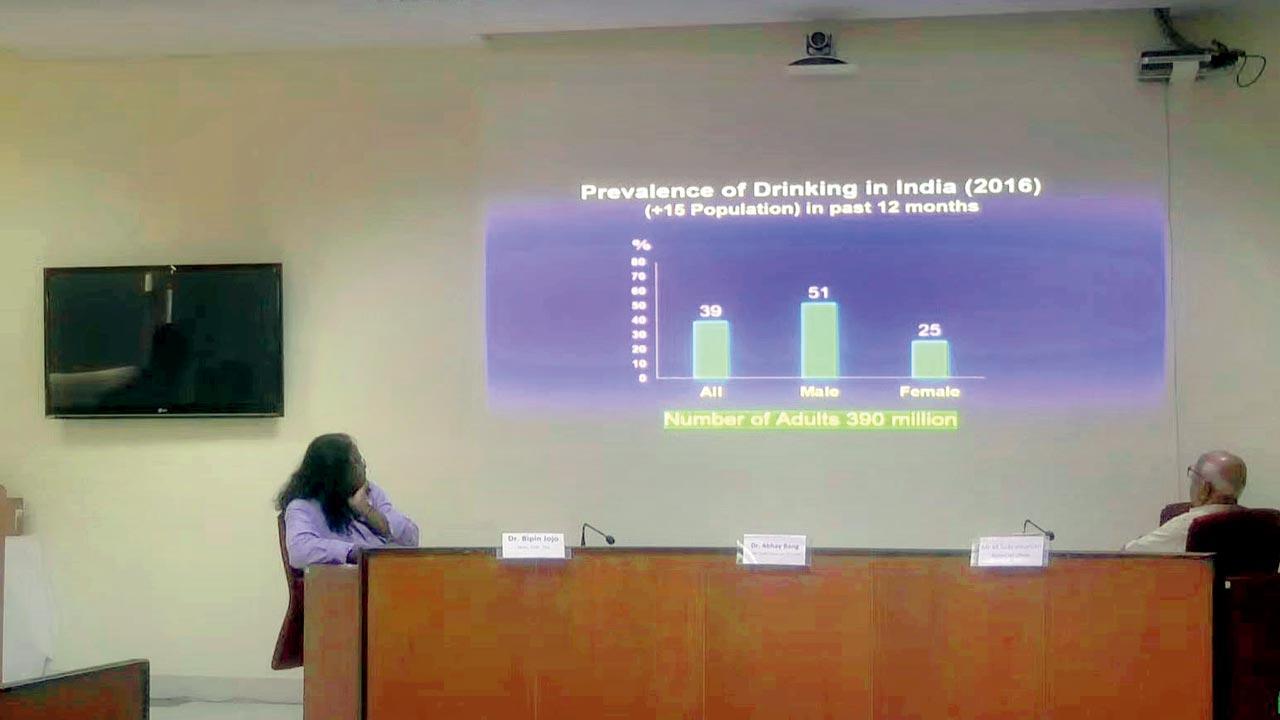Padma Shri awardee highlights ill effects of alcohol in general and during polls, says LS candidates asked to pledge against distribution

Statistical data Dr Abhay Bang presented during his lecture at TISS
At a special lecture arranged by the Tata Institute of Social Sciences (TISS), Padma Shri award winner Dr Abhay Bang highlighted the ill effects of alcohol, stating that it has the capacity to distort elections. In this election, he collaborated with the people of Gadchiroli and took a pledge from all the Lok Sabha candidates to refrain from distributing alcohol for votes.
“Alcohol distorts elections. At the grassroots level, they are often driven by alcohol and money. On the eve of polling, men are given huge amounts of drinks so they act against their better judgment,” said Dr Bang, whose work focuses on healthcare in Gadchiroli, a tribal area. A baseline survey in the area in 2015-16 showed 1,58,000 men to be alcohol consumers with a total out-of-pocket expenditure of Rs 80 crore. Dr Bang has been conducting de-addiction camps in Gadchiroli for the last couple of years in collaboration with the state government, treating 11,707 addicts at 891 such camps. “There has been community involvement at large.
ADVERTISEMENT
It started when women in Gadchiroli forced us to focus our efforts on alcoholism because of the ill effects they were witnessing,” he said. According to Dr Bang, voters asked all candidates contesting for the Lok Sabha seat to provide written and video pledges that they would not distribute alcohol on the day of voting and that they would support prohibition, regardless of whether they get elected. “A total of 85,000 voters signed each pledge and did not vote for candidates who refused this,” he said.
He cited various reports published in Lancet as well as WHO studies on alcohol consumption and stated that at least 7 per cent of Indian men and 4 per cent of Indian women are dependent on alcohol, emphasising the urgent need for policy intervention.
“Increasing prices and taxes reduces alcohol consumption temporarily, but the problem with that is governments become addicted to tax revenue,” he said.
Citing RBI data, he mentioned that various state governments in India collected a total of R1,75,000 crore as tax from alcohol, with Uttar Pradesh being the top collector, followed by Karnataka, Maharashtra, Madhya Pradesh, West Bengal, Telangana, Andhra Pradesh, Tamil Nadu, and Haryana.
“State governments are slaves to alcohol tax because they do not have any other major revenue sources,” he added. Dr Bang stressed that the solution to the alcohol issue in India needs to move beyond taxation. “Scientific opinion on alcohol has changed, and few are aware of it. Doctors agree that only zero consumption is safe consumption. A Lancet editorial has noted this, stating that no level of alcohol consumption improves health,” he said.
“So, restrictions on alcohol access by governments can reduce consumption in the population by 40 per cent and drastically reduce violence against women,” he concluded.
11,707
No. of people treated for alcoholism in Gadchiroli
 Subscribe today by clicking the link and stay updated with the latest news!" Click here!
Subscribe today by clicking the link and stay updated with the latest news!" Click here!








